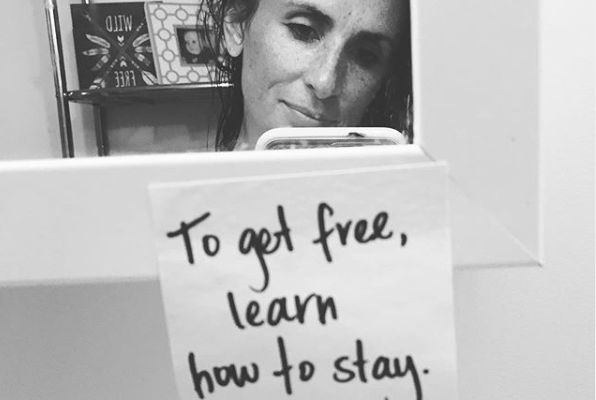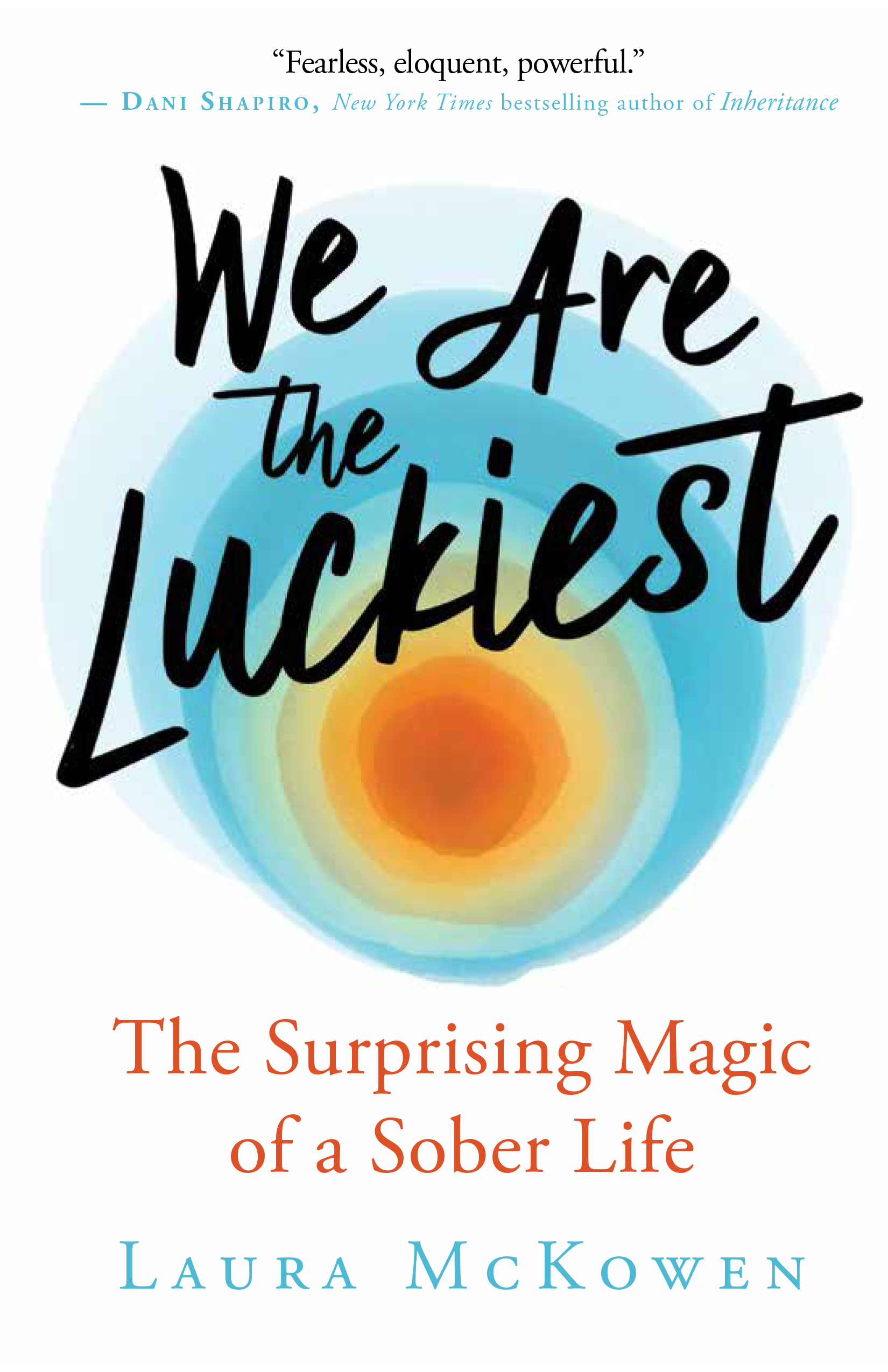
*Warning! Adult language used.
~
Excerpted from the book We Are the Luckiest. Copyright ©2020 by Laura McKowen. Printed with permission from New World Library.
~
The harsh reality is that life always keeps going.
Whether it’s sobriety, weight loss, love, pregnancy, health, your work, or something else, it’s a cruel fact: no matter what you have to face, life doesn’t stop and wait for you to get comfortable first.
It just goes.
The sun comes up. People throw parties and get promoted. Holidays show up just like they did the year before. Babies are born, and meals are made and the dishes pile up in the sink, again and again. And you? Either you change, or you don’t.
I can’t tell you what you should do, and I can’t give you a list of neatly ordered advice and promise it will help. What I can do is the only thing I know how to do, which is to tell you what I did, and promise you it did help me. Things did eventually feel better. My life today is nothing like my life back then.
Just yesterday, I woke at 4:30 am and wrote an entire 3,000-word chapter of this book in two hours. I called my friend to say, “I think I’m done writing for the day, maybe?” And she said, “I think you are.”
Then I worked with the students in the course I’m teaching, took a glorious nap where I dreamed about hanging out with Joe Rogan, got a 90-minute massage, ate some soup and had a cup of coffee with the senior citizens at Panera, created my first original meme, got cat food, got my eyebrows waxed, went and bought some new underwear and pajamas because mine are sad, came home and Marie Kondo’d my whole closet, folded all my laundry while watching “Schitt’s Creek,” picked up Alma from play practice, went and got some dinner, came home, came up with a costume/hair plan for her school dance Friday, washed and folded new clothes, organized my snack bins, and cleaned out the kitty litter. All the while thinking, I am the luckiest goddamn person in the world.
I often think of a quote by Khalil Gibran: “The deeper that sorrow carves into your being, the more joy you can contain.” Yes, this is the shape of me today.
~
The first big step in getting there was that when it came to situations like the one at my mom’s one night, I finally stopped pretending that I felt differently than I did. I’d spent my whole life trying to bypass anger, rejection, and weakness. I’d created an entire persona in order to avoid feeling those things.
I remember the first time I caught myself doing this. Early on in sobriety, I was talking to my friend Holly on the phone while walking to the train after work. I was sighing into the phone, exasperated and near tears, because it literally hurt my body to walk through the five o’clock hour in Boston sometimes, knowing that this time of day would never again mean I was going to slip into the ease of drinking. Even if I did decide to drink again, it would never be with the same ignorance I once had. She asked me a question that made me stop, midstride. “Wait, Laura. Do you miss drinking?” I thought she was joking, but she wasn’t.
I started to do the thing I had been doing, which was to bypass my actual feelings and say the thing I knew I was supposed to say: the more spiritual thing, the thing I thought she wanted to hear. Something like, Well, I mean, no—of course not. I know it’s not what’s best for me. It’s just some lesser part of me that thinks it misses it. I’m fine. But I stopped myself. I breathed.
Finally, I said, “Yes, I fucking miss it. I miss it every day. All the time.”
There it was.
Everything in me wanted to take it back, or to explain more, or to qualify it with some kind of higher wisdom.
But another thing happened inside me then, too.
I felt a burst of expansion, like a pressure valve had been released.
Most of my life up to that point had been a series of small or large acts of pretending, which made the ground I was standing on shaky and unstable. I was never going to feel whole standing on that ground, even when it appeared to be attractive, solid, and right, because it was built on falsities and my soul knew it.
~
One Sunday afternoon in the fall of 2013, Jake, my ex, had come to pick up my daughter, Alma, and I was left with the terrifying empty space of an open, childless sunny afternoon—a time when I would have typically slid right into plans at a restaurant or bar with friends or a date, or even thrown myself a little wine party at home and trailed off into a comfortable numbness. I instead sat there in my big red chair. Sober.
I looked around at the empty, cavernous room; I still hadn’t filled it with more furniture since Jake moved out the year before. And I wailed. I sobbed and screamed, and it echoed off the walls and the hardwood floors. I scared my dog. She hid behind the couch.
When I was done, I grabbed a pen and a piece of paper and furiously wrote everything down. It was maybe the first honest thing I’d ever written. I set down all the ugly words and the humiliating thoughts and the messiness of what I hadn’t been able to admit to myself yet. Things like “no one will ever love me” and “what if I’m boring?” and “I hate my mom and everyone else in my family who doesn’t have a fucking ‘problem’—fuck them all” and “my heart is broken.”
This is part of what I wrote that day:
I am the saddest girl in the world. Time isn’t moving. I’m aware of every goddamn thing I’m doing and not doing.
Here I am, driving my daughter home from school, not going to get wine.
Here I am, taking a walk to the park, not drinking.
Here I am, cooking dinner, without wine.
Here I am, riding the train home.
Here I am, sitting in a meeting.
Here I am, running—drinking coffee—talking to a coworker—eating lunch—sending a text—watching “House of Cards.”
Here I am, coming out of my skin.
~
Two years later, I would look back on those words and use them to write an essay called “The Girl in the Big Red Chair.” It would become my first published essay, on Elephant Journal, and the way a lot of people would first find me and my writing. Which in some way has led me to write these words now, in my first book, which you’re reading. All because I finally admitted what was true: I was in hell, and I hated that other people could drink and I couldn’t.
The truth is alchemical. It transmutes the bitterness of pain and dishonesty and shame into something else, something we can actually live in and stand on. You will hear me talk about telling the truth throughout this book, over and over again, because it is that important. It is also difficult to do because—for many of us—it’s in conflict with how we’ve learned to get our needs met.
But the first step here is to be real with yourself. You don’t have to show your guts to anyone else, not yet. Acknowledge the truth of how you feel about the thing you are going through, and leave nothing unsaid. Whisper it into the dark, say it in a prayer, write it down on paper—whatever. Just get it out of your body. That’s what I did that day, and it started to change everything. Today can be the day you do the same.
~

~






Read 3 comments and reply